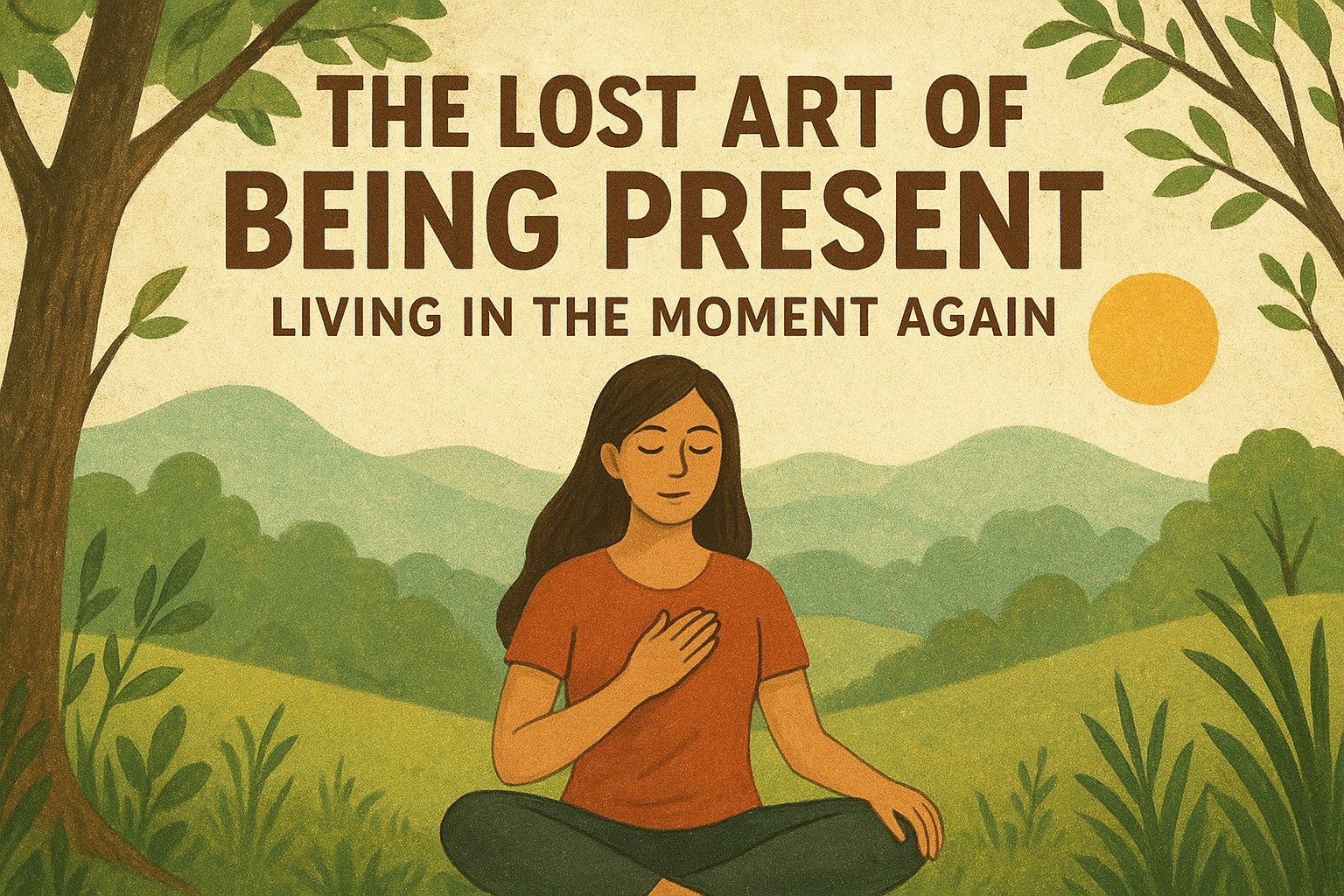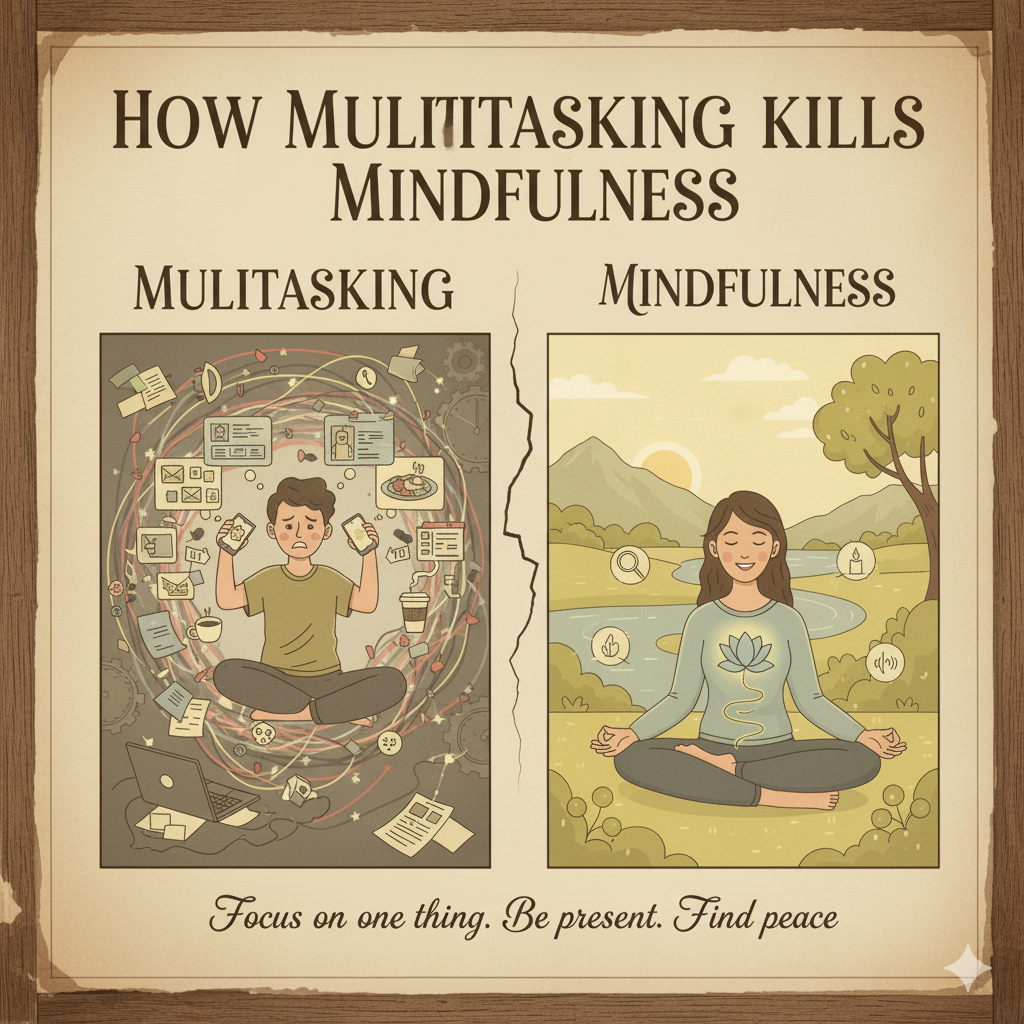The Lost Art of Being Present: Living in the Moment Again
Introduction
Living in the moment has practically become a lost art in a world that continually demands our attention. We are constantly juggling screens, tasks, and ideas - often forgetting to just be in the moment. Nevertheless, there is beauty in having slowed down and noticing details we often look past. This blog is just a gentle reminder to pause, breathe, and return to the beauty of living in the moment.

The Way Multitasking Destroys Mindfulness
We frequently take pride in our ability to multitask – responding to emails while eating lunch, scrolling social media after a workday while watching tv, or thinking about tomorrow’s to-do list while going for a walk. In doing everything simultaneously, we find we aren’t really doing anything with presence or meaningful connection. Multitasking essentially scatters our attention, leaves our minds fragmented, and ensures very little focus on anything. We may be physically present in one space, mentally we can be everywhere and in everything else. While mental juggling is good at times, it has a habit of draining us and dulling our capacity for appreciating simple moments.
Mindfulness, by comparison, thrives on single-tasking – that is full engagement through awareness and intention towards one task at a time. When we allow ourselves the opportunity of giving something our undivided attention, even the most menial task (i.e., sipping tea or hearing someone speak) can actually feel really grounding. In reality, we don’t need to do more, we only need to be more engaged in the things we already do.
The Beauty of Slowing Down
Slowing down is not being lazy—it’s being wise. In a culture that honors the hustle and the fast pace, slowing down can feel a little rebellious. Yet the moment we slow down and purposefully notice life, we will begin to see its beauty unfold. The light of the morning sun streaming through the window, the rhythm of your own breathing, the quiet contentment of enjoying a conversation with a friend—these are all moments that can go unnoticed in the hustle. Slowing down allows us to reconnect with ourselves and what is happening around us. It allows us to listen, notice, and feel more deeply. Paradoxically, when we are not racing, we tend to be more productive because we are operating from clarity and intention. There is a quiet strength in not feeling the need to hurry. When we immerse ourselves in the beauty of slowing down, life stops feeling like to-do list, and instead can feel like an experience to be enjoyed.

Everyday Practices to Remain Grounded
Being grounded does not entail significant lifestyle changes—it’s about creating awareness in small moments to day to day life. Try to wake up in the morning without immediately reaching for your phone; simply take a few deep breaths and notice your feet on the floor beneath you. During the day, check in with yourself—take a moment to notice how your body feels, what feelings are present, and what your mind is focusing on. Even mundane chores, such as washing the dishes or walking to work, can become grounding rituals when you attend to them.
Taking nature time, writing a journal to process your thoughts, or having a gratitude practice every evening might all seem simple, but they are powerful ways of returning to yourself. It’s not about being perfectly relaxed and peaceful all the time; it’s more about coming back to yourself when life is pulling you in a hundred different directions. Even in the chaos of daily life, these small practices are reminders that peace isn’t waiting for you “out there”—it’s grown, here, in your ordinary day.
How the Gift of Presence Strengthens Relationships
When we are fully present with someone, there is a palpable quality about it. Your attention is a gift: silent indication of, “I am with you.” In a distracted world like the one we live in today, there is nothing more rare and restorative than being truly present. Being present has the power to transform conversations into something more honest and profound. When you are present, you are not caught up in thinking of what you will say next. Instead, you are listening to understand the person on the other side of the conversation with patience and truth, not concern to give your own thoughts or responses. When we put our phones down and tune into the person in front of us, we start to notice all the nuances: the tone of their voice, the emotion behind their words, the warm comfort of silence together.
Presence is a way to create trust, build empathy, and connect beyond the surface of life. Presence is the reminder that love and friendship are not about constant and habitual communication, but a true and meaningful connection. The slower we go, and the more we see and us truly see and interact with one another, relationships stop feeling like an obligation, and we start to feel at home.
Conclusion
Ultimately, presence is not an act of escaping life, it is the act of living it. When we slow down, breathe, and pay attention to the world around us, even the most mundane moments can start to feel momentous. The din in our lives quiets, our hearts soften, and life can flow with ease. Presence is nothing we have to chase—it is something we return to, one breath with awareness at a time.
